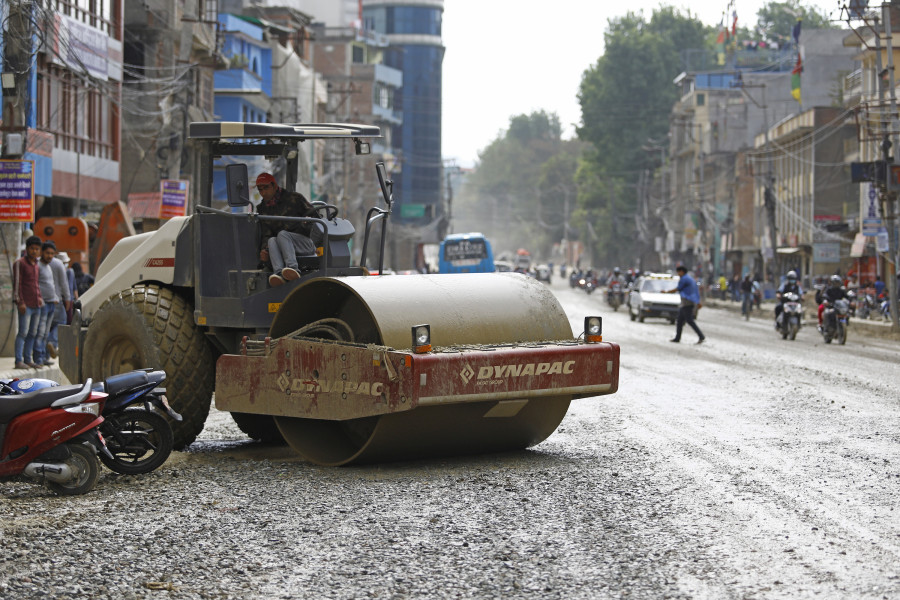Valley
Why development efforts in the country go down the drain—almost always?
The road section in front of the Amrit Science College in Lainchaur is a work in progress—perennially The Kathmandu Upatyaka Khanepani Limited fixes water leakage in the area and the Department of Roads fixes the road every 15 days.
Arjun Poudel
The road section in front of the Amrit Science College in Lainchaur is a work in progress—perennially. The Kathmandu Upatyaka Khanepani Limited fixes water leakage in the area and the Department of Roads fixes the road every 15 days.
Both the agencies are under constant pressure to fix the leakage and repair the roads, as college students continue to complain.
About two months ago, Mahesh Prasad Bhattarai, director general of the water utility, himself went to inspect the site.
“I was shocked to see water pipes just a few centimetres below the road,” said Bhattarai.
Lainchaur-Sorhakhutte is a busy road used by hundreds of vehicles every day. “The pressure and vibrations caused by passing vehicles are enough to damage the pipes, and leaking water causes potholes,” said Bhattarai.
To fix the leakage, water utility staff have to dig the road. Then road office staff arrive to repair the road.In a few days, water starts leaking again. This is a perpetual cycle, and officials say this is just one example of how development efforts in the country usually go down the drain.
The Division Road Office Kathmandu recently concluded that it was impossible to repair the Chabahil road section. The rollers and other heavy machines the office was using led to the leakage of water, as the pipes there also are just a few centimeters below the surface.
Kailash Shrestha, chief of the division, said two water supplying agencies, Kathmandu Upatyaka Khanepani Limited and the Project Implementation Directorate for Melamchi drinking water, have been working simultaneously along the road section.
The Kathmandu Upatyaka Khanepani Limited digs the roads to maintain leaking pipes and change the old rusted pipes. The road office fixes roads. The Melamchi project then digs the road again to lay new supply pipes. The road office again goes to fix the dug up road.
“We have similar problems in most of the places, where we have expanded the roads,” Shrestha told the Post. “It looks like all the agencies are working. But neither the pothole problem nor the leakage issue has been resolved. National resources are going to a waste.”
Multiple officials the Post talked to agree that there is a serious lack of coordination among government agencies.
Water supply utility, the project implementation directorate, Nepal Telecom, Nepal Electricity Authority and the Department of Roads often are found to be working in the same area one after another, which leaves the road sections perennially filled with potholes and leaked water.
“Development is a multisectoral issue, which cannot be achieved without cooperation and coordination among the different agencies concerned,” said Rameshwor Khanal, a former finance secretary. “Lack of coordination among different government agencies is the biggest bane of good governance.”
Every year, the Kathmandu Upatyaka Khanepani Limited spends over Rs50 million for changing old and leaking pipes. But these pipes, which can last over 60 years, will not be used when water from Melamchi arrives. “At this point of time, we are left with no option. We have to change old and leaking pipes to fix leakage, but they won’t be used for Melamchi. This is leading to a waste of money,” said Bhattarai.
One lasting solution, according to officials, can be laying the pipes deeper, so that road construction works do not affect the water pipelines.
“But for that we don’t have a budget. We are a limited company, and the government does not allocate extra budget to us,” said Bhattarai of the KUKL. “That’s why we repair the pipes—or replace the old ones wherever necessary—which are just a few centimetres below the roads.”
It’s not that the lack of coordination is not in the knowledge of the higher authorities.
The Office of the Prime Minister and Council of Ministers calls a meeting of all the department heads of the line ministries, the secretaries and ministers concerned and officials at the National Planning Commission every three months. The meeting ends after stressing the need for cooperation and coordination among the government agencies. But rarely is it implemented.
The Ministry of Finance also calls such quarterly meetings. Officials say questions are raised over the slow progress of development works and the failure to spend development budget.
“I used to think there was no progress because no one informs the authorities concerned,” said Bhattarai. “Actually, everyone knows what’s going on.”
Even as the lack of coordination among the government agencies is not knew, many say much more is expected from the KP Sharma Oli government because it is never tired of talking about prosperity and development.
The Prime Minister’s Office, which is responsible for following up on development works, has its secretaries changed pretty quickly. The frequent changes render the mechanism ineffective.
Khanal, the former secretary, said the prime minister seems to be happy to have “his own people” around him all the time. “He does not seem to be serious about development works. Unless appointments are made on the basis of merit, development will continue to remain a pipedream. The feudal culture of seeking loyalty in ministers, project chiefs, secretaries and department heads still rules the roost. We must get rid of this.”
The lack of coordination among government agencies is symptomatic of fundamental problems that dog the country’s development works.
“When are we going develop our country?” wondered Bhattarai. “Most of the time we are pouring all our resources into one area year after year without having any tangible results.”
Also Read:
Pappu Construction has billions in contracts—and little work to show
Department of roads tightens screw on erring contractors




 14.14°C Kathmandu
14.14°C Kathmandu














